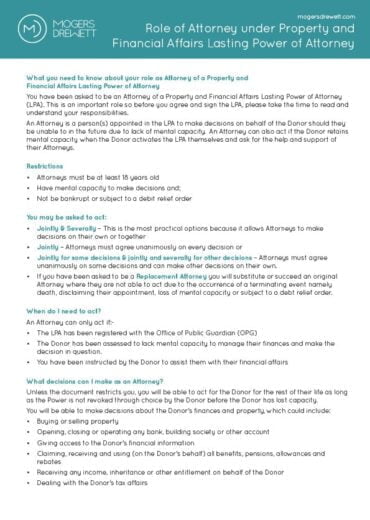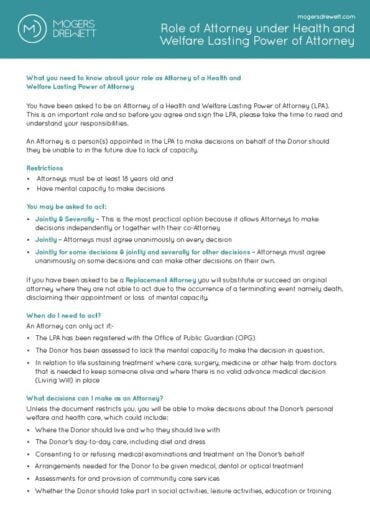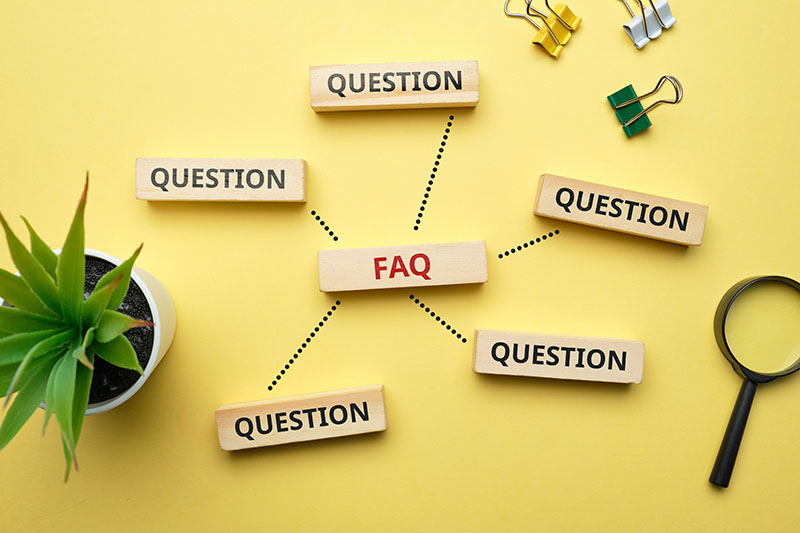Lasting Power of Attorney
Every adult should consider what they would like to happen if they become incapable of managing their own affairs, due to accident, ill health or old age. A Lasting Power of Attorney (LPA) is a legal document that lets you appoint someone (an Attorney/s) you trust to make decisions for you if you are incapable of doing so in the future.
Think of LPAs as an insurance policy. We insure all aspects of our daily lives in case the worst should happen, so why not our ability to make decisions? Once you have made an LPA and the documents have been registered, you can simply file them away, knowing that if anything should happen, everything’s in place to make things easier for you and your loved ones.
There are two types of LPA:
Property and Financial Affairs LPA
The LPA for Property and Financial Affairs allows your Attorney/s to manage your finances and can be used whether you retain capacity or not. Your Attorney/s will only be able to make decisions for you if you are no longer able to make them yourself. They must always act in your best interests, taking into account your previous wishes and beliefs.
Health and Welfare LPA
The LPA for Health and Welfare allows your Attorney/s to make specific decisions in relation to your health and care, but only if you lose the mental capacity to make those decisions yourself. There is also the option to give your Attorney/s the authority to consent or refuse life-sustaining treatment on your behalf.
Enduring Power of Attorney (EPAs)
Since October 2007, it has not been possible to create an EPA. However, existing EPAs, whether registered or not, are still valid. If an Attorney has reason to believe that the Donor of an EPA is becoming mentally incapable of managing their own affairs they can register the EPA with the Office of the Public Guardian. As EPAs only deal with financial decisions, a Health and Welfare LPA is recommended to act alongside.
Next steps: get in touch
If you need legal advice to help put your Lasting Power of Attorney in place, contact our friendly team on: 0800 533 5349 or enquiries@mogersdrewett.com
Meet the team
Frequently asked questions
A Lasting Power of Attorney is a legal document that lets you appoint someone (an Attorney/s) you trust to make decisions for you if you are incapable of doing so in the future.
No. Having an LPA in place does not give anyone authority to act on your behalf without your consent. These documents only allow someone you appoint to make decisions with your consent or when it has been confirmed that you lack the mental capacity to make those decisions for yourself.
If LPAs are created prior to someone losing capacity then they can be registered after capacity has been lost. LPAs cannot be signed after a person has lost capacity. In this instance you would need to apply to the Court of Protection to become a Deputy before you can act on someone else’s behalf. This is a time-consuming and costly exercise, so it is recommended that while you have capacity everyone over the age of 18 should put LPAs in place.
Although it is not strictly necessary to have LPAs registered straight away, it is highly recommended to do so as soon as the documents have been signed. Guidance issued by the Office of the Public Guardian in September 2022 states it can take up to 20 weeks, if not longer, for the documents to be registered.
Anyone over the age of 18. LPAs can only be made if you have the necessary mental capacity. If, for whatever reason, that capacity is lost, you will not be able to make LPAs, so the advice is not to wait.
If no LPA is in place and you are unable to deal with your own affairs, an application will have to be made to the Court of Protection to appoint someone (a Deputy) to act for you. Deputyship applications are very time consuming, expensive and complicated.
Yes, existing EPAs, whether registered or not, are still valid. If an Attorney has reason to believe that the Donor of an EPA is becoming mentally incapable of managing their own affairs, they can register the EPA with the Office of the Public Guardian.
You don’t have to use a solicitor to create an LPA. The application forms from the Office of the Public Guardian (OPG) contain guidance to help you fill them out. It takes up to 20 weeks to register an LPA, providing there are no mistakes in the application and no objections, so it is advisable to get an expert to do the application or check it before sending to be registered. Mistakes will result in delays and having to pay another registration fee to resubmit.
As long as the donor still has mental capacity, they can contact the Office of the Public Guardian (OPG) and ask for their LPA to be ended or for a particular Attorney to be removed. If the donor has lost mental capacity and anyone has concerns about the Attorneys, the OPG will investigate to address complaints.






